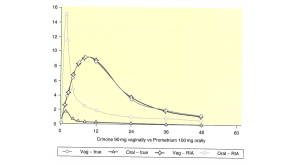
 Given a choice, a majority of patients would prefer to take medications orally. So when it comes to progesterone, why do we prefer the intramuscular or the vaginal route? It's simple: the oral route doesn't work as well. Here’s why:
Given a choice, a majority of patients would prefer to take medications orally. So when it comes to progesterone, why do we prefer the intramuscular or the vaginal route? It's simple: the oral route doesn't work as well. Here’s why:
When you take progesterone orally, the absorption is inefficient. This is because the liver converts the progesterone (first-pass effect) into its relatively weak metabolites (e.g. pregnandiol-3-glucoronide). Thus very little progesterone actually reaches the uterus where it is needed to facilitate pregnancy.
There is a micronized version of progesterone that is better absorbed orally than the regular version (Prometrium). An oral dose of 300 mg may result in a systemic dose of 5 to 10 ng/mL. This level is good for a post-menopausal woman for management of menopausal symptoms. However, in a fertility patient these levels are insufficient.
 Of interest is the fact that most commercial assays do not differentiate between progesterone and its metabolites. Thus, if a progesterone level is checked in a patient taking oral progesterone, the blood level may be falsely high. However with specialized techniques (liquid chromatography and mass spectrometry) the true progesterone levels are quite low. With vaginal administration, the measured levels and the "true" levels are comparable (see figure, by Dr JimToner).
Of interest is the fact that most commercial assays do not differentiate between progesterone and its metabolites. Thus, if a progesterone level is checked in a patient taking oral progesterone, the blood level may be falsely high. However with specialized techniques (liquid chromatography and mass spectrometry) the true progesterone levels are quite low. With vaginal administration, the measured levels and the "true" levels are comparable (see figure, by Dr JimToner).
Oral progesterone also has the disadvantage of making you sleepy. This is the reason why we are not able to use even higher doses of progesterone orally in order for it to be effective.
At least two studies have shown significantly lower success rates in IVF patients that were on oral progesterone vs. intramuscular progesterone. Other studies have compared oral progesterone vs. vaginal progesterone and once again the pregnancy rates were lower with the oral route.
Although the majority of patients would prefer the oral route, most of us would choose the treatment option that results in a higher pregnancy rate. This is the reason why most successful IVF clinics prescribe progesterone as a vaginal suppository or intramuscular injection.
To see a fertility specialist who is a board-certified physician with high success rates, make an appointment at one of InVia’s four Chicago area fertility clinics.
Infertility Infertility treatment IVF Conception InVia Fertility Specialists

Dr. Karande is Board Certified in the specialty of Obstetrics and Gynecology as well as the subspecialty of Reproductive Endocrinology and Infertility. He is a Fellow of the American College of Obstetricians and Gynecologists and Member of the American Society for Reproductive Medicine.
Subscribe to our weekly blog digest

Entire Website © 2003 - 2020
Karande and Associates d/b/a InVia
Fertility Specialists

Comments